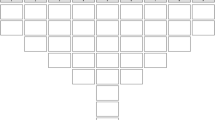abstract
The International Wellbeing Index (IWI) has been developed as a complementary measure to already well-known economic measures, and as a tool for cross-cultural comparisons. It comprises two subscales: the Personal Wellbeing Index (PWI) and the National Wellbeing Index (NWI). The aims of this paper are two-fold. Firstly, to test the psychometric characteristics of the IWI. Secondly, to study how people of Algeria, a third world country that is yet suffering from a harsch economical and social situation, respond to questions dealing with their own lives and life in their country in general, compared to samples from more developed countries where wellbeing was previously measured. The IWI items were presented to individuals either in a questionnaire form to be self-rated or in interview sessions. The total of 1417 answers were analysed. As was expected, a very low satisfaction on both scales was found, compared to the results that were reported in countries, such as Australia or Hong Kong. Comparisons on the demographic characteristics basis show that women are significantly more satisfied than men with their personal lives, though no differences were found with regard to NWI. Eldest and youngest age groups rated the PWI significantly higher than other age groups. Education groups comparisons showed higher ratings on both subscales in favour of groups with no education and those with university levels. Marginal statistically significant differences were found with regard to the PWI in favour of the higher earning group, but no differences in the NWI. No statistically significant results were found as far as marital status, number of children, and income are concerned. The results add to the evidence of the usefulness of the scale to predict satisfaction of people with their own lives and life in their country. Its psychometric performance was proved to be very high in terms of validity, reliability and sensitivity. The results were interpreted on the light of the Homeostasis Theory and the particular situation of the Algerian society.
Similar content being viewed by others
References
Cummins, R.A.: 2002, International Wellbeing Index, Version 2 (Web document: http:// acqol.deakin.edu.au).
R.A. Cummins E. Gullone A. Lau (2002) ‘A model of subjective wellbeing homeostasis: The role of personality’ E. Gullone Cummins (Eds) The Universality of Subjective Wellbeing Indicators Kluwer Academic Publishers Printed in The Netherlands 7–46
R.A. Cummins R. Eckersley J. Pallant J. Vugt ParticleVan R. Misajon (2003a) ArticleTitle‘Development a national index of subjective wellbeing: The Australian Unity Wellbeing Index’ Social Indicators Research 64 159–190
R.A. Cummins R. Eckersley S.K. Lo S.K. Lo E. Okerstrom M. Davern B. Hunter (2003b) Australian Unity Wellbeing Index: Report 7.0 – The Wellbeing of Australians – The effects of work Australian Centre on Quality of Life, School of Psychology, Deakin University Melbourne
George Joffé (2002) ArticleTitle‘The role of violence within the Algerian economy’ The Journal of North African Studies 7 1
International Monetary Fund (IMF): 2003, Algeria: Selected Issues and Statistical Appendix, IMF Country Report No. 03/69.
Lau, A.L.D., R.A. Cummins and W. McPherson: 2003, ‘An investigation into the cross-cultural equivalence of the Personal Wellbeing Index’, In press.
M. Moulai-Hadj (2003) ‘Intercontinental disparities and migration’ W. Glatzer (Eds) Rich and Poor Kluwer Academic Publishers Printed in The Netherlands 179–191
Tiliouine, H.: 2003, ‘Attitudes of Algerian university students towards democracy’, Paper presented at the Fourth Mediterranean Social and Political Research Meeting, Florence & Monticatini Terme 19-23 March 2003, organised by the Mediterranean Programme of the Robert Schuman Centre for Advanced Studies at the European University Institute.
UNESCO: 2000, Education pour tous: Rapport par pays, Algérie, Web document: www.unesco.org.
Author information
Authors and Affiliations
Corresponding author
Rights and permissions
About this article
Cite this article
Tiliouine, H., Cummins, R.A. & Davern, M. Measuring Wellbeing in Developing Countries: The Case of Algeria. Soc Indic Res 75, 1–30 (2006). https://doi.org/10.1007/s11205-004-2012-2
Accepted:
Issue Date:
DOI: https://doi.org/10.1007/s11205-004-2012-2



